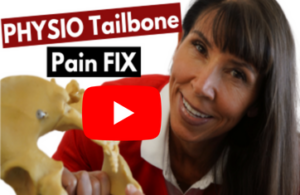 Are your suffering from prolapse anxiety?
Are your suffering from prolapse anxiety?
My good friend Sue just phoned me in tears, she had her first prolapse surgery late last year.
She’d just been to see her gynaecologist who confirmed that 3 months of coughing with bronchitis had caused a repeat prolapse.
Now she needs another prolapse repair. She’s devastated that her days of half marathons and intense gym exercises are over and anxious about her upcoming surgery.
Sue’s call reminded me of the emotional impact of prolapse and how this often goes largely unrecognised by others.
Most women like Sue are simply left to battle on and cope as best they can.
“Anxious, distressed, ashamed, fearful, sexually unattractive, embarrassed, guilty, frustrated, damaged goods, the beginning of the end”
… just some of the feelings women describe upon receiving a prolapse diagnosis.
Prolapse Exercises e-Book
International best selling prolapse exercise guide for women with prolapse and after prolapse surgery.
Prolapse Exercises teaches you how to:
- Exercise safely after prolapse surgery
- Reduce your risk or repeat prolapse
- Avoid unsafe exercises
- Choose pelvic floor safe exercises
- Reduce your risk of prolapse worsening
- Improve prolapse support
- Increase your strength and fitness
- Strengthen your core
- Lose weight
Prolapse treatment tends to focus on fixing the physical problem despite the fact that receiving a prolapse diagnosis can have life changing impact on a woman’s emotional wellness.
Prolapse diagnosis often occurs when a woman is grappling with menopause, teenage kids, ageing parents, weight gain, wrinkles – being told your insides are in effect falling out can feel like the last straw.
Why does the emotional impact of pelvic prolapse barely rate a mention? This is quite astounding when it’s estimated that almost 1 in 2 women who’ve had a vaginal delivery will have some degree of prolapse in their lifetime.
What about the women like Sue who bravely endure recurrent prolapse and repeat prolapse surgery? 
It can be devastating to learn that your prolapse has returned.
It means enduring the prolapse surgery routine again :
- the apprehension
- physical discomfort
- time off work
- rehabilitation
- expense
- exercise restrictions
- social isolation during recovery
- fear of weight gain
- anxiety about repeat prolapse …
A woman’s vagina is a most personal, intimate area of her body – intimately tied with her sense of womanhood, femininity and sexuality.
It’s the birth passage, the area of her first intimate experience that part of her body that evokes the most intense emotions.
And yet the prolapse diagnosis is usually delivered after a clinical invasive and somewhat embarrassing internal examination that leaves the woman feeling vulnerable.
Some women are then informed that they have a prolapse that requires surgery and that they’ll never be able to lift anything heavy for the rest of their life.
This is definitely not intended as criticism of doctor’s doing their vital work to help women! Rather this is a recognition of the emotional impact that prolapse diagnosis can have and a suggestion that some women may routinely benefit from a system that offers emotional support at this vulnerable time of their lives.
How to Deal With Prolapse Anxiety?
There are a number of ways to manage the emotional impact of your prolapse diagnosis or impending prolapse surgery.
Here are some of my thoughts, I’d love to hear your suggestions too … 
- Know you’re not alone
- Discuss your feelings with someone you trust
- Enlist support from trusted friends and family
- Learn about your prolapse to better understand your condition, your prognosis and better self manage
- Stay active and exercise regularly with pelvic floor friendly exercises for prolapse
- Practice stress relieving techniques that help you ease stress and anxiety; deep breathing, mindfulness, meditation, relaxation CD whatever works best for you
- Seek professional support of practitioners with the skills to help you better self manage your prolapse – a counselor or psychologist can help you manage your emotions, a pelvic floor physiotherapist can help you manage many of your practical challenges or your caring doctor.
- Educate others about your prolapse – your prolapse and prolapse surgery are not visible to others who are unlikely to be aware of your feelings of discomfort, lifting restrictions or physical limitations on your daily activities*
- Be kind to yourself – you didn’t set out to cause a prolapse; prolapse risks like having babies, hormonal changes with menopause are normal life events. You can’t be expected to have foreseen that your heavy lifting job, your hysterectomy 20 years ago or unknowingly straining to empty your bowels with constipation could contribute to prolapse. Unfortunately many of us don’t learn about prolapse risk factors until it’s too late through no fault of our own.
*Discussing prolapse with other women in your family may help them too – the tendency towards prolapse can be inherited from one generation to the next.
Some women prefer to keep their prolapse intensely private and deal with their prolapse on their own and this approach needs to be respected too – everyone is different and has their own coping strategy.
I am sending this article to Sue to acknowledge her feelings and support her in dealing with her prolapse anxiety.
I hope that in acknowledging this issue, this article helps you manage your prolapse in some small way too.
If you’d like to send a message of support or helpful strategy to Sue or another women like Sue reading this article please feel most welcome to comment below.


 Are your suffering from prolapse anxiety?
Are your suffering from prolapse anxiety? 




